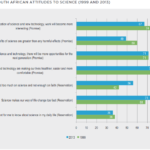Does it matter if students enjoy learning science?
Exploring student attitudes towards science in South Africa

Attitudes about science formed early in life may influence the relationship that adults have with science in general.
How students experience science education at school plays an important role in shaping their attitudes towards school science and in influencing their views about science-related topics as an adult.
The South African public shows signs of becoming more critically engaged with science and technology.
South African students’ enjoyment and value of science is far higher than the international average. In contrast, their belief in their ability to learn science (self-efficacy) is lower than the global average.
Students with positive attitudes towards science tend to engage in desirable science behaviours e.g. reading about science.
Students who engage in science activities at home tend to be more positive about school science.
Positive experiences in the science classroom are linked to positive attitudes expressed by students.
Girls tend to have less positive attitudes towards science, even when they achieve results that are at the same level as boys.
